- Home
- Bonnie Leon
To Love Anew Page 6
To Love Anew Read online
Page 6
6
A guard strode toward the locked cell door. “Lindston . . . Bradshaw . . . Steller,” he called.
John pushed to his feet. This was it. His prison term would begin on one of the decaying ships known as hulks. He didn’t yet know when he’d be sent to New South Wales. It mattered little; his life was no longer his own. The truth of it felt like lead in his gut.
I ought to be thankful to have my life, he told himself. By the grace of God and a good attorney, he’d escaped the gallows. But he couldn’t muster any joy. He’d be lucky to survive the six-month passage. All that he held dear was gone. And worst of all, he’d been betrayed by people he trusted. How could he believe in anyone again?
Margaret’s saucy smile flashed through his mind. As his anguish swelled, he pushed her image aside. She was lost to him forever. Leland Martin had brought word just two days before. Margaret had died from an undiagnosed ailment.
His throat tightened at the thought. Even with her betrayal it was a loss beyond understanding. She deserved it, he thought, his bitterness driving out his grief.
I won’t think on it, he told himself as he picked up a bag containing clothing, soap, tooth powder, and a hairbrush that Leland had left with him. They were his only possessions.
The three men lined up at the cell door. No one spoke. One man kept his eyes on the floor, while the other defiantly glared at the guard. John tried to look indifferent.
The jailer yanked open the door and stood watch while another guard put the men in wrist and ankle irons and then looped chains around their waists, tethering them together.
“Get away with ye. And don’t make no trouble.” The gaoler carried a bludgeon and glared at the defiant-looking bloke. Chains clanking, the three shuffled along the dank corridors of the prison, through a monstrous gate, and outside to a waiting wagon crowded with other prisoners.
John blinked against the bright light of day. He hadn’t been outdoors since his hearing. Most likely this would be a brief encounter with the outside world. His mind carried him to the dark hole he knew was waiting. He didn’t want to think on it.
With the ousting of one dreadful thought, another replaced it and his mind returned to his trial. Outrage filled him, but it was better than despair.
He’d stood in the oppressive courtroom, his senses insulted by the stinking union of cigar smoke, unwashed bodies, and the stale smell of spirits given off from the many spectators. A bellowing plaintiff and the blustering prosecutor harangued. Before Mr. Martin could utter a word, the judge had already made his decision—guilty. John had been certain he’d hang, but then Leland Martin had skillfully presented his background and his character, and John received a prison sentence instead—one to be carried out in New South Wales. Life in prison. The gallows would have been better, he thought dismally.
A guard grabbed him by the arm and thrust him up into the back of the wagon. He barely managed to hang on to his belongings.
“Sit down,” the guard ordered.
John sat on one of two wooden benches that ran from the front to the back of the wagon and then glanced about, trying to get his bearings. His manacled ankle was secured to a bolt in the floor. The irons cut into his skin.
While the last of the three men from John’s cell was being shackled, the wagon lunged forward and the prisoners started their trek through the city. John tried not to look at staring bystanders. Instead, he concentrated on the buildings and the markets. It would most likely be his last look at London. The fast pace of the city, the cries of vendors, and the merging smells of cigars, coffee, and horse manure that he’d complained of only a few weeks before no longer repulsed him.
How had life gone so awry? He stifled a shudder.
John glanced at the other prisoners. There were ten others locked in just as he was. A skinny young man looked back at him. John could see panic and disbelief in his blue eyes. He wondered if the same expression lay behind his own gaze. Under normal circumstances he would have offered a smile of encouragement, but John had nothing to give. Instead, he looked down at his hands and slid the manacles down to loosen them slightly.
The wagon moved slowly through the streets. John wished the journey over. He didn’t like the stares. What if someone he knew saw him? He couldn’t bear that. The horses plodded on, and the more of London John saw, the more wounded he felt at being dragged off to another continent. There is no justice, he thought, the bitterness inside growing.
They rumbled past businesses and crouching cottages, and John wondered where Henry had gotten to. Was he somewhere along this very route? If he saw him, what would his response be? Rage boiled inside. He deserved a chance to face the man, to tell him what he thought of his deception, his treachery.
All of a sudden, a young apprentice who had worked for John stepped into his line of vision. The lad’s eyes widened when they met John’s. He quickly looked away and then back again. He held his previous employer’s gaze and finally nodded in respect. John managed a slight smile, thankful for the kind gesture.
The wagon turned a corner and rolled over cobblestone streets, heading for the Thames. So it’s the river, then. The hulks tethered along the Thames might be better than the ones in the bay. Still, his stomach tightened. He’d heard stories about the misery on board the decaying ships.
Transportation for the term of his natural life, the judge’s voice reverberated through his mind. How will I endure?
His father’s voice replaced that of the judge’s. “One day at a time, son.” How many times had he heard that advice? More than he could count. When John had been fearful or had wanted to give up on something that seemed too difficult, his father was there, steady and wise. “You can’t scale a mountain all at once,” he’d said when John had lamented over learning the machine trade.
One day at a time, John told himself. I can do today. That’s all I need think of. Today will be my first day of survival.
The cart approached the river and a row of tethered hulks. The derelict ships looked like hideous caricatures of vultures hunched over carcasses, their wings spread possessively. Dread swept through John and his earlier resolve faltered. What awaited him? Bile rose up into his throat and he swallowed, trying to keep his stomach in place.
The wagon jolted to a stop, and the men were unloaded and marched across a gangplank that tied a hulk to the shore. “This’ll be your home for a while,” one of the guards said, chuckling. “Enjoy your stay.”
The prisoners were handed off to marines wearing red-breasted uniforms. They were hustled onto the ship and into a small room, then left to wait. A guard remained at the door.
The prisoners sat on the floor. John rested his back against a bulkhead. A small man who reminded John of a scrawny chicken couldn’t keep from crying. As he sobbed, his shackles clanked.
“Stop your sniveling,” a prisoner next to him ordered. “You chose your lot like the rest of us. Now it’s time to pay the price. Why you crying like a baby?”
“Got me a family,” the man said, wiping his nose with the back of his hand. The movement carried the other man’s hand with his.
He jerked back on the chains. “Aye! Keep my hand away from your nose.”
The man’s shoulders drooped. “Don’t deserve this. All I done was get me family somethin’ to eat. We was starvin’. ”
The prisoner chained to him glared. “You’re no different than the rest of us. We all done something we figured we had to do. And none of us is innocent.”
The door opened and an officer stepped into the room. Arms folded across his chest, he stared at the men. “Up on your feet.” No one moved. “Stand up, I said.”
The men stared; some slowly stood.
“Up with you! Now!”
The authority in his voice got the rest of the prisoners to their feet. He nodded to the guard who then removed the men’s manacles.
“Now, strip. I want everything off.” The guard at the door proffered a wooden club. “I wouldn’t want anyone to b
e bludgeoned on their first day here.”
Although still tied to one another, the men managed to undress. Most stood in their underdrawers.
“I said everything.”
The underdrawers came off.
The men stood naked and vulnerable. Wearing a smirk, his eyes heated by scorn, the officer looked the men over and then walked out.
“Now what?” a rather rotund prisoner asked.
No one answered.
The men moved to the wall and sat. John pulled his knees up close to his chest, and tried not to think about his imminent future. Instead, he allowed his mind to return to his father. I’m glad he can’t see me now, he thought, rubbing his sore wrists. He hoped he’d stay free of the irons.
John rested his chin on bent knees and closed his eyes, longing for rest. He was weary, to his very heart.
Without warning, the door was flung open and a tall, heavyset man stepped into the room, followed by a sailor. The first man was so tall, he had to bend to get through the door. “Up! Everyone up!”
The men scrambled to their feet. John’s muscles tensed. He kept his eyes straight ahead.
The man walked to the first prisoner in line. “Bend forward.” The convict did as he was told. The big man looked through the prisoner’s hair. “Straighten up. Open your mouth.” He peered inside the man’s mouth, checking his teeth, and then examined his body, including the prisoner’s private places. After that he moved to the next man and the next, examining each similarly.
When he’d finished, he said, “You’re a healthy enough lot. Get dressed.” He left abruptly.
The prisoners struggled back into their clothes. The guard opened the door and stood aside. “Out with you. Now.”
John and some of the others picked up their belongings. “Leave ’em,” the sailor barked. “You’ll have no need.”
“But they’re all I got,” one man said.
Instantly the soldier smashed the butt of his gun into the man’s face. Dropping to his knees and covering his nose with his hands, the prisoner cried, “Ye broke me nose!”
“Next time you’ll do as you’re told. Now, get up!”
Still holding his hand over his face, the man stumbled to his feet and staggered after the rest of the group. They assembled on deck and stood waiting, for what they did not know. A sharp, cold wind buffeted them. Marines stood guard, muskets ready.
A man whom John thought might be the captain strode up before them. Hands clasped behind his back, he stood silently for a long while and studied the prisoners. His eyes were hard. “While you’re on my vessel, you’ll do as told. You’ll get your rations twice a day. If you ask for more you’ll get less the next day, so you’d be wise to be glad for what you’re given. And there’ll be no pinching food.” He walked to the railing. “You’ll have one hour of lamp light a night. We don’t waste oil on my ship.” He lowered his gaze, peering out from beneath heavy eyebrows. “When I say sleep you’ll sleep, and when I say work you’ll work. You disobey and you’ll feel the lash.”
He turned and faced the men straight on. “You won’t set sail for a while. ’Til you’re transferred, you’re mine. There’ll be lady passengers sailing with you, but don’t be getting any ideas. They’re not for the likes of you.”
John knew this was only a taste of what was to come. He looked toward the city. An ugly brown cloud draped itself over brick and mortared buildings. Chimneys stuck up defiantly from rooftops, as if to say they would continue belching soot into the air, like it or not. And John would take orders, like it or not. For his world had gone askew, and he had no say about its course.
He’d wanted adventure. Had he wished this upon himself? Was it some kind of judgment? If there were a way to return to the life he’d once had, he would gladly go.
But there was no returning now. He’d lost his life—forever.
Before Ruby or her family roused from their sleep, Hannah had quietly slipped out of the house. She’d left a note, explaining her reasons for going. She didn’t want to create trouble between Ruby and her husband. Ruby’s kind heart wouldn’t be able to put her out. She’d shortchange her own family in order to help. Hannah couldn’t bear to be the cause of more struggles for the kindly woman. She and her family had trouble enough. Her difficulties were her own and not Ruby’s responsibility.
After spending hours walking, she wondered if she’d made the right choice. Her legs and feet ached, her shoulder throbbed from carrying her satchel, and her stomach growled angrily at its emptiness.
She stopped at every business she thought might have work. No one needed help. She didn’t know where else to look. There must be someone who has a place for me. Lord, where should I look? She heard no answer. But of course she wouldn’t, not after what had happened. She was defiled and had most certainly been shut out of God’s favor. Unwillingly her mind carried her back to the attack. She could feel him touching her. She could still smell him.
“Aye! Watch out!” shouted a man pushing a cart of vegetables.
Distracted, Hannah had nearly run into him. “So sorry, sir,” she called after the man, but he didn’t hear as he hurried on.
Children had gathered to watch a Punch and Judy show. Hannah stopped, thankful for the distraction. As the marionettes yelled at each other and chased one another about the small stage, the performance didn’t seem at all entertaining. Screaming her frustration, Judy whacked Punch over the head with her broom and the children laughed, but their antics only disturbed Hannah. She moved on, hoping to put the sounds of the play behind her.
The emptiness in her stomach gnawed. The smells of baked goods and the calls of peddlers selling produce only made her hungrier. She stopped at a display of apples. Picking up one, she held it to her nose and smelled its sweet fragrance. Her mouth watered. She could almost taste it. What if she were to drop it into her bag? Would anyone see? She looked about and her eyes locked with the peddler selling the fruit. Her heart skipped. He stared as if knowing her thoughts. She quickly set it back in the pile and, as nonchalantly as she could manage, ambled on.
She kept walking, finally leaving behind the sounds and smells of the marketplace. Weary and feeling faint, she leaned against a building. Two gaunt-looking children, probably a brother and sister, approached a gentlewoman, their hands held out palm up.
“Ye ’ave a pence for us, mum?”
The woman opened a small coin purse, fished out two pence, and dropped one into the boy’s hand and then the girl’s.
“Thank ye, mum.” The children tucked their treasures into their pockets and ran off toward the market.
Hannah felt envious. If only it were so easy for her to acquire funds. Perhaps I could beg, she thought and tried to imagine herself holding out a hand and entreating someone to give her money or food. The image repelled her. She couldn’t. She wouldn’t—no matter how hungry she became.
The aroma of baked goods wafted from a shop across the street. Hannah’s stomach cramped. Perhaps the owner needed a clerk or a cook. She crossed the road, stopped at the door to tidy her hair and smooth her wrinkled skirt, and then stepped inside.
She admired rows of heavy brown breads and sweet cakes laid out on display. Holding her spine straight, she smiled at a man standing behind a counter. “Good day, sir. You have a fine shop.”
“That I do.” He eyed her warily.
“Might I inquire if you need some assistance?” Before he could say no, Hannah hurried on. “I can do most anything. I’m quite clever. I’m a fine cook and I’ve a strong back for cleaning and such, and I also read and do figures. I get along well with most everyone. I helped my mother—”
The baker held up his hand, palm out. “I’m sorry. I wish I could help you, but I’ve no need. And even if I did, I’ve not an extra farthing to pay you.”
“Of course. I’m sorry to have bothered you.” She headed for the door, her eyes lingering on the breads.
Hannah hurried out of the store and walked down the street toward the river.
She stepped onto a bridge and started across. Midway she stopped. She had nowhere to go.
Leaning on the railing, she studied the river as it washed beneath the bridge. Its waters were brown and murky. The cold, dark surge called to her. It could be her way out. She could end her sorrows. All she need do was to step off into the icy waters. It would be over quickly.
Hannah envisioned her mother. She longed to be with her, but Hannah was afraid. If she ended her own life, would she be allowed into heaven? And could God accept her now that she was so badly tarnished? Tears of sorrow trailed down her cheeks.
Hannah stood there for a long while. Hadn’t her mum said the Lord accepts all who believe in him—even sinners? Hannah had always thought God loved her. Her mother had told her so. But that was before . . . before she’d been so badly used.
It was not a risk she could take, and so she moved on as darkness settled over the city. It was cold. The wind swirled frigid air beneath her cloak. If only she could warm herself at a fire. She remembered the stove in her cottage and the many times she and her mother had sat quietly in the evenings sipping tea and enjoying the rest. An ache swelled at the base of her throat, and she wondered how far it was to the churchyard where her mother lay.
7
Huddled inside her cloak, Hannah walked for what seemed like hours. The darkness deepened and streetlamps were lit. Strumpets moved onto the streets, lingering along the roadway and leaning against buildings. Some strolled provocatively to better entice clients.
Hannah tried not to look at them as she moved past. A number of the women gave her haughty looks. She hurried on, hoping to find a place to seclude herself. A gentleman dressed in a silk suit approached. He boldly looked her up and down and then stared into her eyes.
“How much for an hour?”
Hannah could not believe what she’d heard. She tried to walk past him, but he stepped in front of her. “Sir, you’ve made a mistake. I’m not what you think.” She glanced at the streetwalkers.

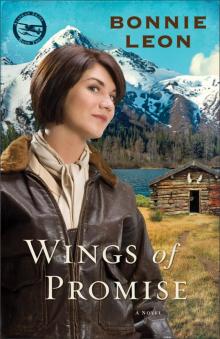 Wings of Promise
Wings of Promise Touching the Clouds
Touching the Clouds Joy Takes Flight
Joy Takes Flight Enduring Love
Enduring Love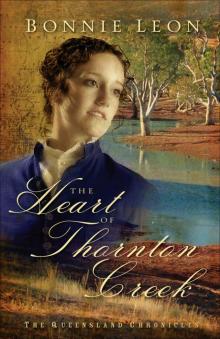 The Heart of Thornton Creek
The Heart of Thornton Creek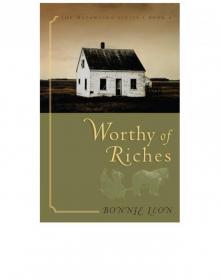 Worthy of Riches
Worthy of Riches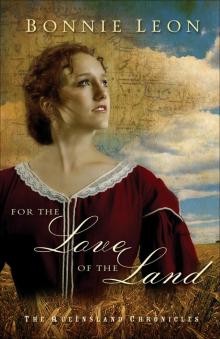 For the Love of the Land
For the Love of the Land To Love Anew
To Love Anew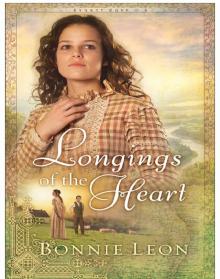 Longings of the Heart
Longings of the Heart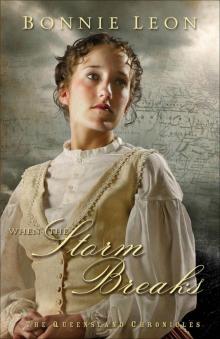 When the Storm Breaks
When the Storm Breaks